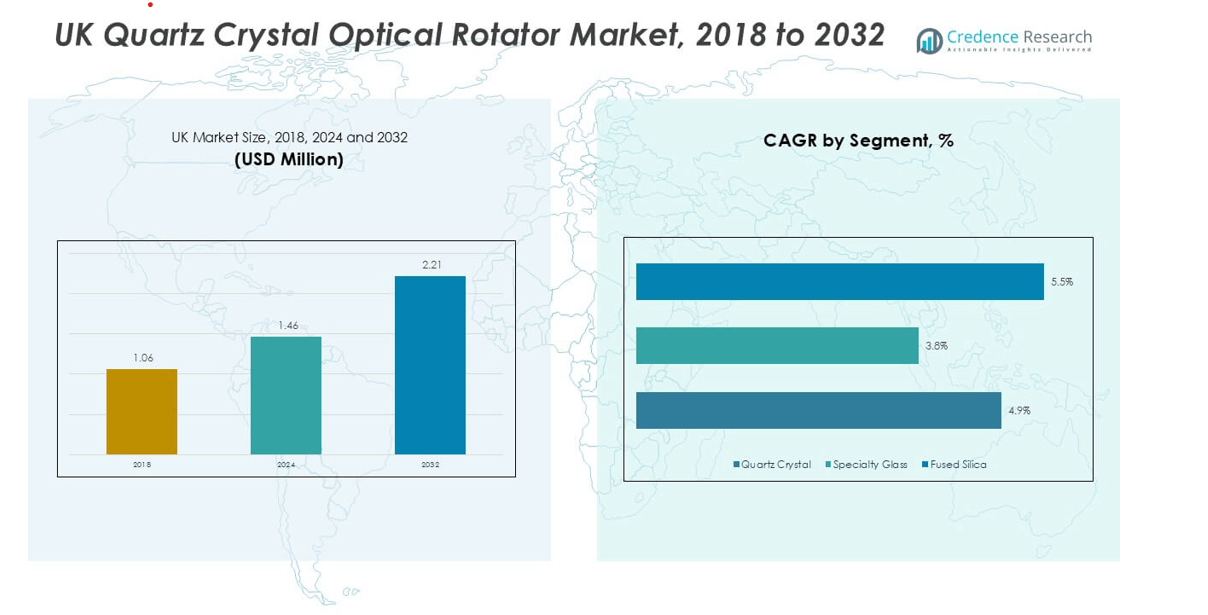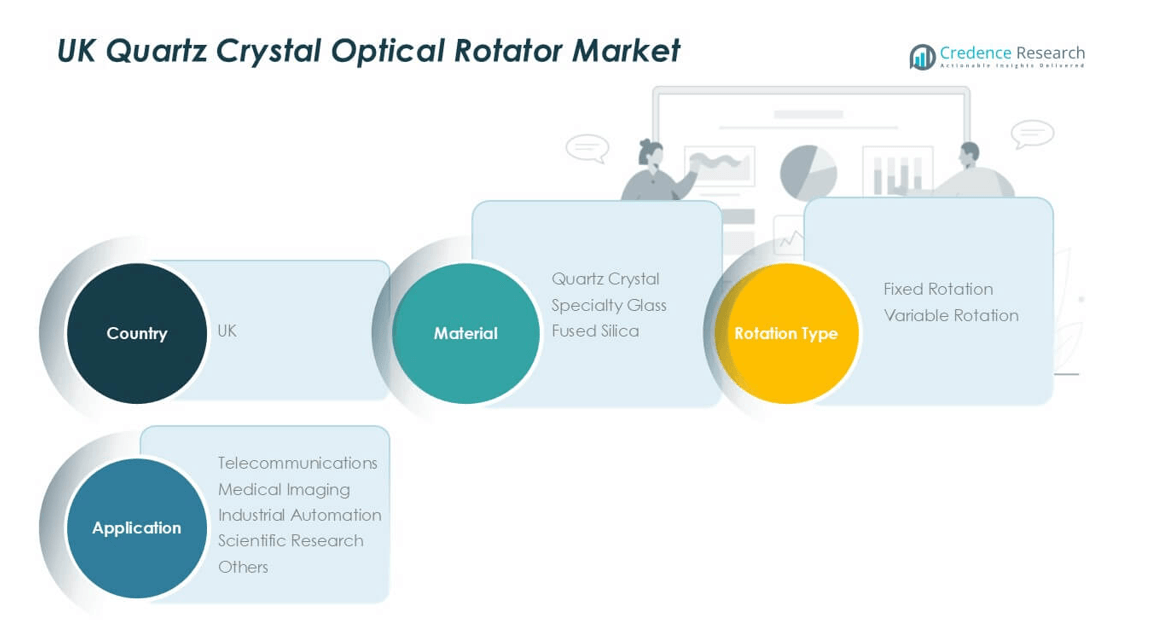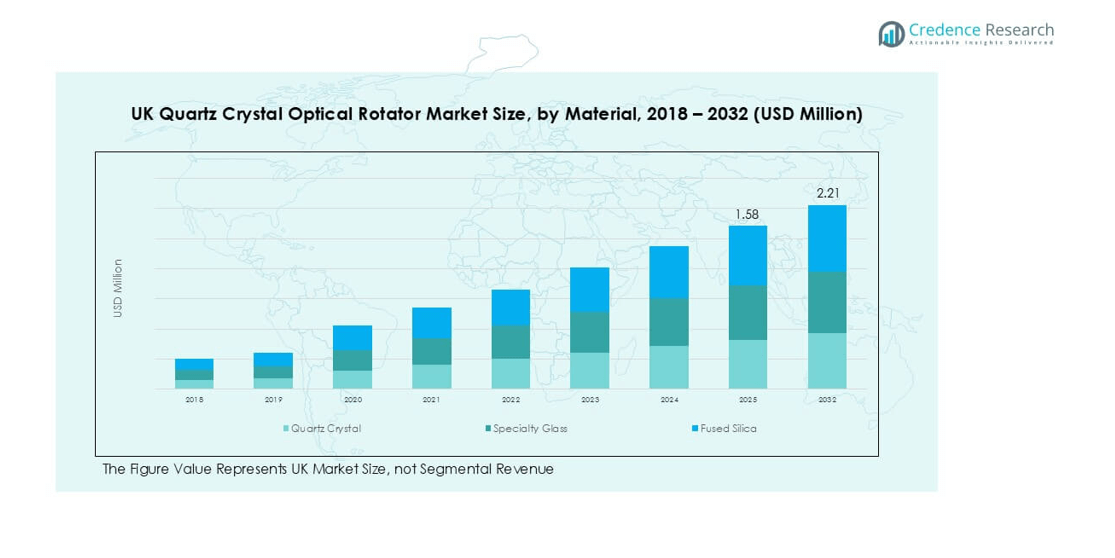Market overview
The UK Quartz Crystal Optical Rotator market size was valued at USD 1.06 million in 2018, reaching USD 1.46 million in 2024, and is anticipated to reach USD 2.21 million by 2032, at a CAGR of 4.95% during the forecast period.
| REPORT ATTRIBUTE |
DETAILS |
| Historical Period |
2020-2023 |
| Base Year |
2024 |
| Forecast Period |
2025-2032 |
| UK Quartz Crystal Optical Rotator Market Size 2024 |
USD 1.46 million |
| UK Quartz Crystal Optical Rotator Market, CAGR |
4.95% |
| UK Quartz Crystal Optical Rotator Market Size 2032 |
USD 2.21 million |
The UK quartz crystal optical rotator market is shaped by leading players such as Crystal Innovations Ltd, OpticaQuartz Solutions LLC, Optical Engineering Dynamics LLC, Quartz Precision Instruments Inc, and SpectraQuartz Corporation, which dominate through advanced product portfolios and strategic investments in telecommunications and medical imaging applications. These companies maintain strong R&D capabilities and collaborate with research institutions to enhance precision and miniaturization of optical rotators. Regionally, England, including Greater London and the South East, leads the market with a 45% share in 2024, supported by its concentration of telecom infrastructure, healthcare facilities, and industrial hubs. Scotland and Northern England follow with 25%, driven by strong research clusters, while Wales and the West Midlands account for 18%. Northern Ireland, the East Midlands, and other regions collectively represent 12%, contributing smaller but growing demand. This regional spread highlights England’s dominance while showcasing balanced opportunities across the UK market.

Market Insights
- The UK Quartz Crystal Optical Rotator market was valued at USD 1.46 million in 2024 and is projected to reach USD 2.21 million by 2032, growing at a CAGR of 4.95% during the forecast period.
- Market growth is driven by expanding telecommunications infrastructure, rising demand in medical imaging, and increasing use in industrial automation, where polarization control enhances performance and precision.
- A key trend is the integration of optical rotators with photonics and quantum research, alongside miniaturization and customization of components for medical, defense, and portable devices.
- The competitive landscape features major players such as Crystal Innovations Ltd, OpticaQuartz Solutions LLC, Optical Engineering Dynamics LLC, Quartz Precision Instruments Inc, and SpectraQuartz Corporation, focusing on R&D, cost optimization, and tailored solutions to sustain growth.
- Regionally, England leads with 45% market share, followed by Scotland and Northern England at 25%, Wales and West Midlands at 18%, and Northern Ireland, East Midlands & other regions at 12%, while quartz crystal dominates by material share.
Access crucial information at unmatched prices!
Request your sample report today & start making informed decisions powered by Credence Research Inc.!
Download Sample
Market Segmentation Analysis:
By Material
Quartz crystal dominated the UK market in 2024, holding the largest share due to its high optical activity, precision, and cost-effectiveness in commercial production. Its reliability in telecommunications and medical imaging systems reinforces its leadership over specialty glass and fused silica. Specialty glass is gaining traction for niche scientific applications, offering higher customization and chemical resistance. Fused silica remains important in advanced optical research, valued for its low thermal expansion and superior UV transparency, but its higher production costs limit wider adoption compared to quartz crystal.
- For instance, Edmund Optics offers a 90° crystalline quartz polarization rotator with parallelism < 10 arcsec and rotational accuracy < 5 arcmin.
By Rotation Type
Fixed rotation types accounted for the largest share in 2024, supported by widespread use in stable optical systems within telecommunications and industrial automation. Their consistent performance and simpler design make them preferable for large-scale integration. Variable rotation types, while representing a smaller share, are increasingly in demand for advanced scientific research and precision medical imaging where adjustable polarization is required. The rising need for flexibility in optical experiments is expected to support gradual adoption of variable rotation technology in specialized applications.
- For instance, fixed quartz rotators from Karl Lambrecht have rotation tolerances of ±0.06° at 1064 nm and ±0.7° at 347 nm.
By Application
Telecommunications emerged as the dominant application segment in 2024, driven by the rapid expansion of fiber optic networks and data transmission systems across the UK. The high demand for polarization control in long-distance communication underpins quartz crystal rotator adoption in this sector. Medical imaging follows as a fast-growing segment, with increasing use of advanced diagnostic imaging requiring polarization precision. Industrial automation contributes steady demand, particularly in optical sensing and laser alignment, while scientific research remains a critical niche, fostering innovations that support future applications. Other applications show smaller contributions but highlight emerging opportunities in specialized optics.
Key Growth Drivers
Expanding Telecommunications Infrastructure
The growth of the UK quartz crystal optical rotator market is strongly driven by rapid developments in telecommunications. Fiber optic networks are being upgraded to meet rising data traffic from 5G services, cloud computing, and digitalization. Optical rotators play a critical role in polarization control, ensuring stable signal transmission over long distances. Telecom operators in the UK continue to invest heavily in high-bandwidth connectivity, fueling demand for these precision components. The expanding need for data reliability and improved network performance makes telecommunications the single largest growth driver for optical rotator adoption across the region.
- For instance, Edmund Optics’ 90° crystalline quartz polarization rotator (25.40 mm dia) offers parallelism <10 arcsec and rotational accuracy <5 arcmin.
Rising Demand in Medical Imaging
Medical imaging applications are another major driver of market growth. Advanced diagnostic technologies such as MRI, CT scans, and optical coherence tomography increasingly require polarization-sensitive components for higher imaging accuracy. Quartz crystal optical rotators enhance precision and clarity in these systems, improving patient outcomes. The UK’s growing healthcare investments, coupled with an aging population, are pushing hospitals and diagnostic centers to adopt advanced imaging solutions. This trend creates strong demand for optical rotators in healthcare equipment. The medical sector’s preference for reliable and high-performance optical components underpins its role as a key growth driver.
- For instance, Euroquartz (UK) has more than 30 years designing quartz crystals and oscillators specifically for medical equipment, supporting reliable performance in medical devices.
Growth of Industrial Automation
The UK’s ongoing adoption of Industry 4.0 technologies is fueling demand for optical rotators in industrial automation. Automated manufacturing and robotic systems use advanced lasers, sensors, and optical alignment devices, where quartz crystal rotators provide polarization control for improved accuracy. The shift toward smart factories and precision engineering industries, such as aerospace and defense, further expands opportunities. Government initiatives supporting automation and smart manufacturing create a favorable environment for growth. The ability of quartz crystal rotators to deliver reliability in demanding industrial settings positions them as a vital component for efficiency and quality assurance in modern production.

Key Trends & Opportunities
Integration with Photonics and Quantum Research
A notable trend in the UK market is the growing integration of optical rotators with photonics and quantum research projects. Universities and research institutions are investing in polarization-sensitive devices for advanced optical experiments. This creates opportunities for rotator suppliers to collaborate with research hubs, fostering innovation in quantum computing and photonic communication. The push for research leadership in emerging technologies enhances the role of quartz crystal optical rotators, particularly in scientific research applications where precision and adaptability are crucial.
- For instance, at Heriot-Watt / Rutherford Appleton Laboratory, a 13.11 mm thick quartz plate rotates polarization by 89.3° at 1030 nm, corresponding to a specific rotatory power of 6.8°/mm at room temperature.
Miniaturization and Customization of Optical Components
The trend of miniaturization is reshaping market opportunities. Compact and customized optical rotators are in demand for portable devices, medical instruments, and defense optics. Manufacturers are focusing on reducing device footprints while maintaining high performance, catering to sectors like handheld diagnostic tools and mobile optical systems. This opens opportunities for UK-based suppliers to develop tailored solutions for end-users, enhancing competitiveness. The ability to offer application-specific customization is becoming a key differentiator in the market, aligning with customer demand for versatile optical technologies.
Key Challenges
High Manufacturing Costs
One of the biggest challenges for the UK quartz crystal optical rotator market is the high cost of manufacturing. Precision engineering of quartz crystals involves complex processes and stringent quality standards, raising production expenses. Small and medium-sized enterprises face difficulties competing with global suppliers due to limited economies of scale. The cost factor often restricts wider adoption in price-sensitive applications, especially in smaller research institutions or industries with constrained budgets. Addressing cost barriers through manufacturing innovations and partnerships remains a crucial challenge for market players.
Competition from Alternative Materials and Technologies
The market also faces pressure from alternative polarization control technologies, including liquid crystal devices and advanced specialty glasses. These substitutes often provide flexibility, lower costs, or easier integration in certain applications. While quartz crystal rotators are highly reliable, the increasing adoption of alternatives in niche sectors poses a threat to their market share. Companies need to invest in continuous innovation and differentiation to maintain competitiveness. Overcoming the challenge of substitution will be key for ensuring long-term sustainability of quartz crystal optical rotators in the UK market.
Regional Analysis
England
England accounted for the largest share of the UK quartz crystal optical rotator market in 2024, representing around 45% of total revenue. Greater London and the South East serve as the primary hubs for advanced telecommunications, medical technology, and research institutions, creating strong demand. The concentration of healthcare infrastructure and leading optical component manufacturers in this region further reinforces dominance. Investments in 5G rollout, coupled with strong academic partnerships in photonics, are supporting consistent growth. England remains the leading market due to its mature technology base and established industrial ecosystem.
Scotland & Northern England
Scotland and Northern England together held around 25% of the UK market in 2024, supported by strong industrial research clusters and scientific institutions. Scotland’s universities and photonics research centers play a critical role in driving demand for advanced optical components. Northern England, with its growing industrial automation and manufacturing base, also contributes steadily. Investments in renewable energy and defense applications add momentum to adoption. The region’s emphasis on research-driven innovation makes it a significant contributor, especially in scientific applications, where high precision quartz crystal optical rotators are widely used.
Wales & West Midlands
Wales and the West Midlands captured approximately 18% of the UK market in 2024. The region benefits from strong industrial and automotive manufacturing, where optical rotators are integrated into automation and laser-based applications. Wales’ growing research base in optical technologies and the West Midlands’ advanced manufacturing ecosystem support steady adoption. Healthcare facilities in urban centers also contribute to demand in medical imaging applications. While smaller in scale compared to England, the region is experiencing steady growth as local industries invest in high-precision optical components for industrial and diagnostic systems.
Northern Ireland, East Midlands & Other Regions
Northern Ireland, the East Midlands, and other UK regions collectively accounted for around 12% of the market in 2024. These areas represent smaller but emerging contributors, driven by academic research, medical imaging adoption, and smaller-scale industrial automation projects. Northern Ireland’s growing technology sector is adding gradual demand, while the East Midlands supports adoption through its industrial base. Although their share is limited compared to other regions, targeted investments in research and regional development initiatives indicate growth potential. These regions are expected to play a supportive role in the overall UK market expansion.

Market Segmentations:
By Material
- Quartz Crystal
- Specialty Glass
- Fused Silica
By Rotation Type
- Fixed Rotation
- Variable Rotation
By Application
- Telecommunications
- Medical Imaging
- Industrial Automation
- Scientific Research
- Others
By Geography
- England (including Greater London & South East)
- Scotland & Northern England
- Wales & West Midlands
- Northern Ireland, East Midlands & Other Regions
Competitive Landscape
The competitive landscape of the UK quartz crystal optical rotator market is characterized by a mix of established manufacturers and emerging technology providers competing on innovation, product reliability, and application reach. Key companies such as Crystal Innovations Ltd, OpticaQuartz Solutions LLC, Optical Engineering Dynamics LLC, Quartz Precision Instruments Inc, and SpectraQuartz Corporation dominate the market through strong product portfolios and established partnerships in telecommunications, medical imaging, and industrial automation. These firms leverage R&D to enhance precision, miniaturization, and adaptability of optical rotators, ensuring consistent market presence. Emerging players like QuartzWave Technologies LLC, Spectral Optics Corp, Visionary Photonics Inc, and Optical Quartz Ltd are carving out positions by focusing on customized solutions for niche applications, particularly in scientific research and defense optics. Strategic growth initiatives include expanding regional distribution, forming research collaborations, and scaling production capacity. The competitive environment remains dynamic, with companies emphasizing innovation, cost optimization, and differentiated offerings to sustain growth in an increasingly technology-driven market.
Shape Your Report to Specific Countries or Regions & Enjoy 30% Off!
Key Player Analysis
- Crystal Innovations Ltd
- OpticaQuartz Solutions LLC
- Optical Engineering Dynamics LLC
- Quartz Precision Instruments Inc
- SpectraQuartz Corporation
- QuartzWave Technologies LLC
- Spectral Optics Corp
- Visionary Photonics Inc
- Optical Quartz Ltd
- Deltronic Crystal Industries
Recent Developments
- In June 2025, major showcasing of advanced photonics and optical systems occurred at the Laser World of Photonics event, featuring innovations relevant to high-precision optical manipulation
Report Coverage
The research report offers an in-depth analysis based on Material, Rotation Type, Application and Geography. It details leading market players, providing an overview of their business, product offerings, investments, revenue streams, and key applications. Additionally, the report includes insights into the competitive environment, SWOT analysis, current market trends, as well as the primary drivers and constraints. Furthermore, it discusses various factors that have driven market expansion in recent years. The report also explores market dynamics, regulatory scenarios, and technological advancements that are shaping the industry. It assesses the impact of external factors and global economic changes on market growth. Lastly, it provides strategic recommendations for new entrants and established companies to navigate the complexities of the market.
Future Outlook
- The market will expand steadily, supported by rising demand in telecommunications networks.
- Medical imaging will remain a fast-growing segment due to adoption of advanced diagnostic technologies.
- Industrial automation will drive demand as smart factories and precision engineering grow in the UK.
- Research institutions will increase usage in photonics and quantum technology experiments.
- Miniaturization of optical components will create opportunities in portable medical and defense devices.
- Competition will intensify as alternative polarization control technologies enter the market.
- Companies will focus on customization to meet sector-specific optical performance requirements.
- Regional dominance will continue with England leading growth through strong infrastructure and R&D.
- Collaboration between manufacturers and universities will foster innovation and product development.
- High production costs will remain a challenge, pushing players to invest in cost-efficient technologies.






